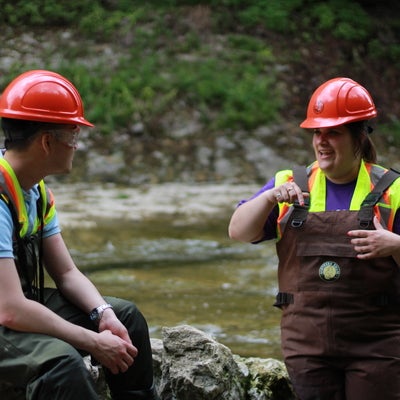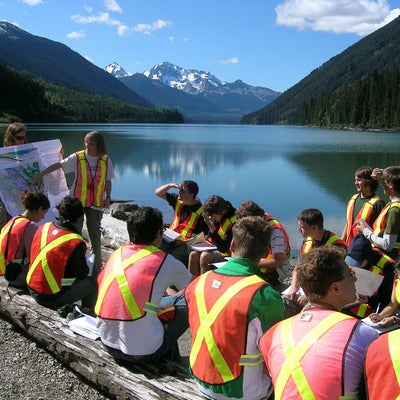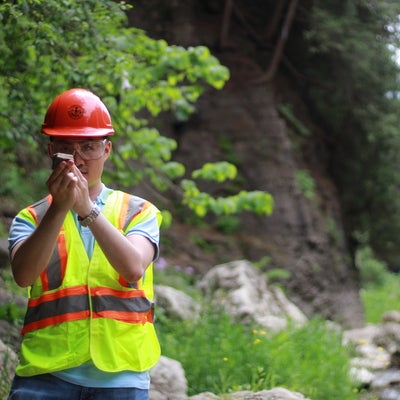Why Geological Engineering?
Our Geological Engineering program merges geoscience with innovative design to guide humanity’s interaction with Earth materials and Earth system processes.
You’ll engineer smart and sustainable solutions for natural hazards, infrastructure design, CO2 geosequestration, geothermal energy, and natural resource development, including precious metals and minerals that are essential to electric vehicles and clean energies, all while incorporating the latest innovations in laboratory testing, numerical simulation, field characterization and monitoring, sensors, artificial intelligence (AI) and satellite imagery. You'll benefit from a robust curriculum that combines classroom learning with hands-on fieldwork, innovative research opportunities and co-op placements that provide real-world experience. Graduates of the program are well-equipped to tackle challenges related to earth materials, natural hazards and sustainable development, making them highly sought after in various industries, including construction, mining and environmental consulting.
Courses in Geological Engineering
You’ll take a mix of foundational engineering, chemistry, physics and mathematics courses in first year. After first year, most of your classes will be Geological Engineering and Earth Sciences courses covering topics related to energy and mineral resource extraction, soil and rock for infrastructure, geohazards and hydrogeology.
Sample first-year courses
This is a sample schedule. Courses are subject to change.
| Fall Term (September to December) | Spring Term (May to August) |
|---|---|
Upper year courses
For information about courses past your first year, check out the Undergraduate Academic Calendar.
Customize your degree with options and specializations
Options
Options are a way to provide you with a path to expand your degree and get a secondary emphasis in another subject or area. Students should decide if they are interested in taking options as they enter second year. Some available options are:
Specializations
A specialization is recognition of selected elective courses within your degree. Specialization offerings are unique to your engineering program and are listed on your diploma. Specializations that are available to Geological Engineering students include:
Co-op for Geological Engineering students
You’ll have an unrivalled opportunity to gain paid work experience before you even graduate. We’ll help you navigate job applications, résumés, and interviews; you’ll have the added benefit of trying out different roles and/or industries to find the one that fits you while building your work experience and reinforcing your in-class learning out in the real world. It all adds up to a competitive advantage after graduation.
Starting in first year, you'll normally alternate between school and work every four months, integrating your classroom learning with real-world experience. You can return to the same employer for a couple of work terms to gain greater knowledge and responsibility or work for different employers to get a broad range of experience.
| Year | September to December (Fall) | January to April (Winter) | May to August (Spring) |
|---|---|---|---|
| First | Study | Co-op | Study |
| Second | Co-op | Study | Co-op |
| Third | Study | Co-op | Study |
| Fourth | Co-op | Study | Co-op |
| Fifth | Study | Study | - |
Your first work term will be halfway through first year. Learn more about co-op.
Example co-op positions for Geological Engineering students
- Geological engineering assistant
- Field engineering
- Technical assistant
- Industrial buildings inspector
- Mining/energy engineering student
- Rock mechanics
- Water/wastewater project assistant
- Geotechnical/material technician
Scaling new heights on co-op
Ryan Tang, Geological Engineering Student
Ryan is a third-year Geological Engineering student with an unwavering spirit for adventure.
“What I love most about geological engineering is the potential for adventure. At its core, it has allowed me to explore amazing opportunities and experiences. The job prospects of geological engineering could lead to more work in remote places and exotic countries.”
Hear more from Ryan as he narrates the thrilling story behind the photo that won him first place in the “Where in the World?!” photo contest, recaps valuable lessons from all three of his work terms and provides insight for students considering an international experience of their own.

Example careers for Geological Engineering graduates
- Geological Engineer
- Rock Mechanics Engineer
- Water Specialist
- Geothermal energy lead
- Geotechnical Engineer
- Junior Program Engineer
- Mining and Environmental Consultant
- Geohazard analyst
Capstone design projects in Geological Engineering
Capstone Design is the culmination of the engineering undergraduate student experience, creating a blueprint for innovation in engineering design.
Supported by numerous awards, Capstone Design provides Waterloo Engineering students with the unique opportunity to conceptualize and design a project related to their chosen discipline.
A requirement for completion of their degrees, Capstone Design challenges students teams to push their own boundaries, and apply the knowledge and skills learned in the classroom and on co-op work terms. It reinforces the concepts of teamwork, project management, research and development.
For a full list of previous capstone design projects, see our Capstone Design website.
DADS Consulting (Capstone 2025)
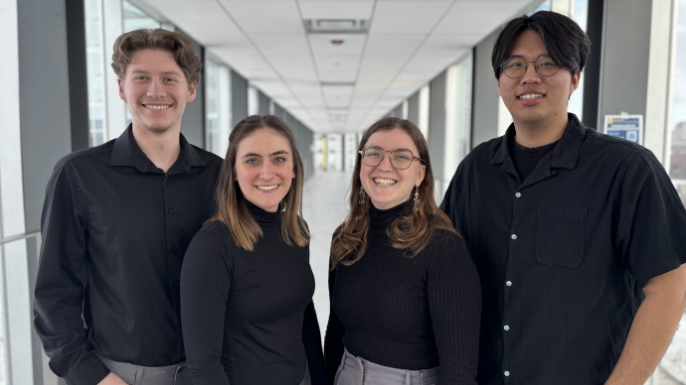
Davis Jeffery, Soo Young Jeon, Dominique Levesque, Abby Towaij
Burgundy Diamond Mines Ltd are actively mining the Sable Kimberlite deposit at Ekati Mine in the Northwest Territories as an open pit and are transitioning to an underground below this location. DADS Consulting has been retained to assess the geological and structural conditions of the north wall in Sable Pit and design an optimal portal for the underground. Several alternative models are generated to evaluate tunnel stability, culminating in a final design of the most cost-effective and safe portal.
Solutions TBD (Capstone 2025)
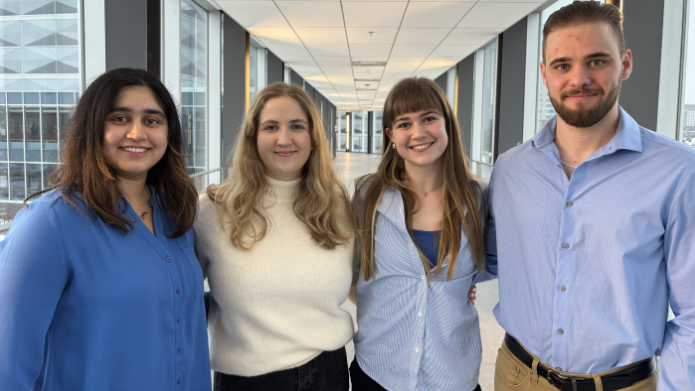
Clare Burnley, Safia Damji, William Mazhar, Caroline Robertson
Robert Service Way is a thoroughfare of Whitehorse, Yukon. It is adjacent to an unstable escarpment prone to localized failures during the spring thaw. Shallow earth slides and mudflows threaten traffic and local trail networks. After detailed site characterization, Solutions TBD proposes combining geohazard mitigation strategies to reduce landslide risks and consequences.
Student design teams
The Sedra Student Design Centre consists of over 20,000 square feet of space dedicated to design teams and student projects. There are more than two dozen design teams, all of which are student-led, and many of which represent Waterloo internationally.
Some examples include:
Warrior Home

Warrior Home is a multidisciplinary student team that designs and builds high-performing, net-zero energy, affordable, and sustainable homes for community housing organizations.
Engineers Without Borders

Engineers Without Borders (EWB) is an non-governmental organization founded by Waterloo graduates that work towards ending poverty within the world. The UW chapter of EWB is also working towards a globalization of engineering curriculum and encourage growth within the fair trade market.
UWAFT

UWAFT (University of Waterloo Alternative Fuel Team) continuously breaks new ground in the field of sustainable transportation through innovation, technology, and student engagement.
Geological Engineering alumni
Brittany Russo

Brittany (class of 2019), "modern day society is dependent on Geological Engineering, either through building foundations, oil and gas, or mining."
Read more about Brittany's time in Geological Engineering.
Ali Kamalipour

Ali (class of 2009), "I chose Geological Engineering because it satisfied my curiosity in applied earth sciences by teaching me the engineering thought and problem solving process."
Read more about Ali's time in Geological Engineering.
Jeanette Fooks

Jeanette (class of 1993), "being a part of my Geological Engineering class, I was lucky to have a small class that really was a family during my Waterloo journey."
Read more about Jeanette's time in Geological Engineering.
Kyle Verwey

Kyle (class of 2010), "between my class, stream, residence, and varsity friends there was never a dull moment. Each avenue of individuals made growing in, then excelling at Waterloo an amazing experience."
Read more about Kyle's time in Geological Engineering.

